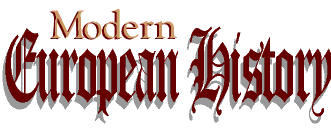
|


|
|
|
Mr. Sedivy's
More Features:
|
Highlands Ranch High School - Mr. Sedivy
- Modern European History - The History of Hitler
The Irony Of It All It has been said that one man cannot change history. Alexander the Great, Christopher Columbus, Napoleon Bonaparte, and Abraham Lincoln, all brought out the best and the worst in men. Throughout time, we have put immense power in the hands of few and now their names live on forever. But how can one man change history? How does the son of an Austrian factory worker come to European power and become responsible for the deaths of as many as 35 million people? Adolph Hitler was born in the year 1889. His father died in 1912 and left him a meager inheritance. Adolph fancied himself a sensitive artist, and moved from Austria to Bavaria where many unemployed artists of his time lived. Bavaria was much like Greenwich Village in the 1960's and Adolph Hitler was a hippie of sorts. World War I was in full swing, at the time, and Austria sent Hitler his draft notice, which he claimed he never received. He was arrested for dodging the draft and was sent back to Austria. Upon his return, he was sent to take his Army physical and flunked. He returned to Bavaria and there enlisted in the German Army as an Austrian citizen. After basic training, Hitler was sent to the Western Front where he was assigned the duty of messenger. He was responsible for running orders from the Field Commander to the front line, usually under heavy fire. Hitler was twice awarded the Iron Cross. He beat incredible odds just to survive and later referred to his days at the Front as the best of his life. In October, 1918, he was blinded by poisionous gas and was still recovering when the Armistice cease-fire was signed. After the Treaty of Versailles was signed, ending World War I, Corporal Hitler went to work for the Weimar (democratic) government, as a spy. His job was to observe the new political parties starting up in Germany and his orders were to watch and attend the meetings of the German Workers party in Munich. Hitler reported that the group was not very threatening, that they mostly got together, drank beer, got drunk, and went home. Regardless, Hitler was ordered to infiltrate the organization and become a member. He was quickly accepted into the group and was put in charge of recruitment and propaganda. In Februaury of 1920, Adolph Hitler gave his first recruitment speech, one which would become familiar. He spoke about anti-semitism, anti Treaty of Versailles, anti democracy. One week after this meeting, the party changed its name to the National Socialist German Workers Party -- NAZI. Up to this point in his life, Hitler had been an introvert with no friends; he was painfully shy and afraid of large crowds. All of this was changing, and in April of 1920 he resigned from the German Army. He now would devote all his energy to politics and the Nazi party. Hitler, at the age of thirty-one, had finally found something he was good at. Did he fall into this by sheer luck? Or was it destiny? This was a man whose high school guidance counselor likely told him he would never amount to anything. Hitler did research on German mythology and adopted the Swastika as the symbol of the party because, according to myth, it is the symbol of the beginning of all creation. Hitler was beginning to create his ideal world. In 1923, Hitler thought it was time to make his move; he organized a putsch (a take-over of a government) on the city of Munich. It failed miserably. Hitler and his followers were arrested and charged with treason. Hitler turned his trial into a propaganda triumph and received a great deal of publicity when he pleaded guilty, not of treason, but of being a patriot. He was sentenced to five years in prison, but he never served his full time because no one in authority truly believed him to be any kind of a threat. Hitler learned many lessons from the failed Munich putsch; prison gave him time to think and set goals. While imprisoned, he wrote a book entitled Mein Kampf, meaning, my struggle. In his book he explains his ideas on race, and describes his ideas for his Two Thousand Year Government moving into the east and taking over Russia. It completley explained all of his plans, which he would eventually follow to the ‘T'. Hitler believed that he had survived World War I because it was his destiny to create the third German empire -- the Third Reich. It was all there in black and white and no one bothered to read the book except Winston Churchill, who was denounced for expressing concern about Hitler when the rest of the free world was preoccupied with fears about Russia and communism. Once out of jail, Hitler started to rebuild his party and was secretly receiving subsidies from the German army in support of the Nazi party. He started using powerful propaganda that would eventually become known as The Big Lie. The theory behind the Big Lie was that the masses would believe a big lie more than they would belive a little lie, if they heard it often enough. Hitler bombarded the people with talk of peace, nonviolence and a strong unified Germany, while all along he was sytematically planning to attack Russia and purge Germany of all non-Arians. Hitler made his Nazi party as visable as possible, using bright colored uniforms, arm bands, flags and banners. He glorified the military by starting the Hitler Youth program. Hitler established his S.S. (the secret police) to act as his body guards and started out with seventy five soldiers. Hitler placed Heinrich Himmler at the head of the S.S., an evil, wicked man who would eventually be responsible for the murders of millions of people. Himmler himself only ever witnessed one execution, as his stomach was too weak for the gore. He lost his lunch. The Weimar government was run by a coalition of fascists, communists, socialists, and so on. All of the parties were pulling for power and when they had to elect a new Chancellor of Germany, none of the parties had enough votes to win the position, so they all decided to elect Hitler, as a puppet figurehead, because he seemed harmless enough. In 1933, Hitler was elected by a democratic process to the position of Chancellor of Germany. Less than one month after he was elected Chancellor, a fire broke out in the Reichstag building (similar to our congress) known as the Reichstag Fire. Hitler seized the moment and claimed the fire was really a coup attempt by the communists. The S.S. destroyed documents and framed the communists. All of the communist leaders were arrested and sent to Dachau -- the beginning of the concentration camps. As Chancellor of Germany, Hitler declared a state of emergency, taking away all personal rights and freedoms. The accidental fire allowed Hitler the opportunity to become Dictator. In April, 1933, Hitler issued another decree, blaming the Jewish people for all of Germany's problems. A boycott of all Jewish business took place over a period of months. Hitler segregated the Jews. The German people did not buy into beliefs of antisemitism and Hitler knew that even a dictator needed the support of the people to go to war; so, under the cloak of darkness and secrecy, Jews began to disappear from their homes. On June 30, 1934, Hitler ordered his S.S. to begin killing Nazi party leaders. They were ordered to kill anyone too weak or too strong. This was known as the Night of Long Knives. He required absolute, blind loyalty or you died. Hitler successfully purged his party of all his rivals. He now had one party, that of Adoph Hitler. As the saying goes, the rest is history. One man did change the world forever. Was Hitler's rise to power truly destiny? The hippie son of an Austrian factory worker leading the most feared Nazi government. Few men have had such an impact as Adolph Hitler. He did bring out the best and worst in men and his name lives on forever. After Hitler's reign of power the world became a different place than it had been before and it will never be the same again. - Mr. Sedivy's Excellent Information - Sample Research Papers
Information for Students
Research Activity Mr. Sedivy no longer teaches geography, or Modern European History (non AP), but we've decided to leave his web contribution to these classes up anyway. The AP classes cover the same material, but in more detail. Advanced Placement Modern European History
|
Highlands Ranch High School ![]() 9375 South Cresthill Lane
9375 South Cresthill Lane ![]() Highlands Ranch, Colorado 80126
Highlands Ranch, Colorado 80126 ![]() 303-471-7000
303-471-7000
Mr. Sedivy's History Classes
| Colorado History | American
Government | Advanced Placement Modern European
History | Rise of England | World
History |
| Home | Back to top of page |
Site Contents |

